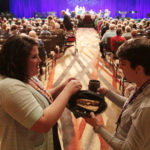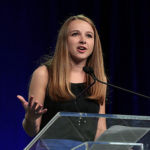Posted 6/28/03
| CBF church starting strategist Phil Hester introduces Mary Beth Caffee, who is starting a church in Maine, one of 40 CBF new church starts across the nation. Hester was an advertising executive in Houston before entering seminary later in life and then starting a church in California. |
Anonymous gift will enable CBF to appoint
missionaries despite budget shortfalls
By Mark Wingfield
Managing Editor
CHARLOTTE, N.C.–Gifts of $9 million from an anonymous donor will enable the Cooperative Baptist Fellowship to continue to appoint new missionaries next year despite budget shortfalls.
Participants in the CBF's general assembly approved a basic budget of $17.1 million for the 2003-2004 fiscal year, to be supplemented by an additional $2.64 million in designated gifts. The bulk of that designated money derives from a $5 million gift received in April and a $4 million gift received the previous year, both to be disbursed over a four-year period.
Without the special gifts, the CBF would not be able to appoint any new missionaries in the 2003-2004 fiscal year, said CBF Coordinator Daniel Vestal. And the anonymous gifts made possible the appointment of 15 short-term and career missionaries at the CBF general assembly June 27.
 |
| Cooperative Baptist Fellowship Moderator Phill Martin presides over the tri-annual meeting of the Coordinating Council at its June 25-26 meeting preceding the Fellowship’s 13th General Assembly in Charlotte, N.C. (Lance Wallace photo) |
“We are not appointing any new missionaries, except for those that are funded by designated gifts,” Vestal told the CBF Coordinating Council June 25. He re-emphasized that at the June 27 general assembly commissioning service for 18 mission workers.
“Honestly, we could not be here tonight without the support of a generous donor,” Vestal told the assembly.
Sign up for our weekly edition and get all our headlines in your inbox on Thursdays
Total giving to the CBF increased this year, but undesignated gifts did not meet budget goals, Vestal reported to the Coordinating Council.
The CBF was projected to end the current fiscal year June 30 with a $650,000 shortfall in undesignated receipts over expenditures, even while keeping expenditures at 85 percent of budget. That budget shortfall will be covered by drawing from reserve funds, said finance committee Chairman Philip Wise, pastor of Second Baptist Church in Lubbock.
Total income for the year was projected to reach about $15 million, said CBF Chief Financial Officer Jim Strawn. That's short of a basic budget of $18.2 million.
The CBF's budget woes mirror national trends in other religious bodies, noted outgoing Moderator Phill Martin, a layman and member of Wilshire Baptist Church in Dallas. “This is not a phenomenon CBF is dealing with. This is a phenomenon faith-based organizations are dealing with.”
The shortfall, various CBF officials explained, stems from a collision of two primary forces–optimistic budgeting and tough economic times in churches.
Vestal told the Coordinating Council 241 churches gave to the CBF for the first time in the last six months. About 25 of those first-time givers are Hispanic churches, and about 115 are from Texas, he added.
That is one of many signs that things are going well in the CBF, despite the budget challenge, Martin told the general assembly.
“Things really are great with CBF, but there is one thing that is of concern. … Our corporate vision and dreams for CBF are greater than our commitment to funding,” he reported.
For example, Martin said, 130 people are exploring a call to missionary service with CBF. “We are uncertain about being able to add to our numbers. That is not in keeping with our vision.”
He added: “Funding is not an easy question or subject. … If we are to continue to say things are great at CBF, we must all pay attention to funding of national CBF.”
The funding challenge portends changes for other areas of CBF life beyond missions.
CBF staff will receive no salary increases in the new fiscal year. That's the second year of flat compensation for the CBF's coordinators, the corps of top-level division directors.
The CBF's partner entities also face reduced financial support, although a policy change creates the potential for them to get more money sooner in the year.
Under previous policy, the CBF distributed allocations to seminaries and other partners at an 85 percent of budget ratio until year end, then made up the difference, if funds allowed, in a 13th check. Under the new policy, partners will receive a monthly allocation keyed to that month's flow of gifts into the CBF. For example, if total gifts run 5 percent below budget, the partners will receive 95 percent of their budgeted allocations for that month. The distributions will not exceed 100 percent of budget, however.
 |
| Cooperative Baptist Fellowship Finance Committee Chair Philip Wise made the recommendation that monthly partner funding be directly tied to the Fellowship’s monthly undesignated receipts. Wise serves as pastor of Second Baptist Church, Lubbock, Texas. (Lance Wallace photo) |
For the 2003-2004 fiscal year, the partner entities are budgeted at the level of actual distributions in the year just ended, meaning a full allocation for 2003-2004 will be 85 percent of what had been budgeted in the 2002-2003 year.
Partner entities, none of which are owned or managed by the CBF, include 13 schools that are budgeted to share $1.13 million. Other partners are the Baptist Joint Committee, $212,500; Associated Baptist Press, $137,700; Baptist Center for Ethics, $85,000; Baptists Today, $42,500; and Baptist World Alliance, $20,000.
The BWA contribution could draw particular scrutiny in the year ahead, as the CBF seeks final approval for its membership application. That application could be approved by the BWA this summer.
That likelihood already has cost the BWA $125,000 in funding from the Southern Baptist Convention. SBC leaders have protested strongly against the CBF application and have hinted they might reduce funding even further. This year's drop from $425,000 to $300,000 from the SBC is a 34 percent reduction from the SBC.
Ironically, the CBF several years ago reduced its own funding for the BWA from $100,000 to the current $20,000 level–an 80 percent reduction. That change was done in a budget realignment, officials said at the time.
Speaking to the Coordinating Council June 25, Vestal acknowledged the CBF's level of funding for the BWA needs to be revisited. “If our application is accepted, we've got to be good partners,” he said. “That means we have to increase our financial support.”
How the CBF's budget allocations shape up in the future–particularly if further cuts are required–could be influenced by the report of a budget priorities task force given to the Coordinating Council June 25.
The report was not officially adopted but was received as information.
It identified six areas for highest-priority funding–most-neglected and unevangelized people, church starting, developing partnership missions with local churches, supporting theological education, nurturing congregational health, and fostering congregational leadership. Except for theological education, all the top priority areas relate to the CBF's own Atlanta-based programs.
It also identified four areas least important and, presumably, the first suggested for budget cuts–collegiate ministries, marriage and family, chaplaincy, and Baptist identity.
In the new budget, Baptist identity includes funding for ethnic and regional networks, interim pastor support and allocations to the Baptist Joint Committee, ABP, BCE, Baptists Today and the BWA.
Further, the budget priorities task force recommended that in the future, total allocations to partner entities be limited to 20 percent of the CBF budget. Currently, partner funding accounts for 28 percent of the budget.
The prospect of reducing the pool of available money to divide among partner ministries drew mixed responses from members of the Coordinating Council, with some suggesting those ministries ought to be less dependent upon the CBF and others suggesting the CBF ought to help keep them strong.
In the 2003-2004 fiscal year, the CBF has budgeted its largest single share of undesignated money for global missions, $9.63 million. That will be supplemented by $2.02 million in designated funding and will support 149 short-term and career missionaries, partnership missions with local churches, missions administration and church starting.
Other budget areas include $2.33 million for administration, $2.1 million for leadership development, $1.02 million for communications and marketing, $984,579 for building community and networking, $663,063 for faith formation and $375,000 for the general assembly.
Also as part of budget-cutting measures, the CBF will scale back its two regional resource centers–one in Dallas and one in Raleigh, N.C.
See related stories:
• CBF: Churches should talk about 'mission' rather than budget to overcome shortfalls
• CBF: Vestal: Diversity must express itself in common stream of witness
• CBF: Youth ministries need to enlist, affirm parents
• CBF: Campolo urges 'Fight the good fight' for justice
• CBF: Healthy churches rest on seven pillars, consultant says
• CBF: Leonard says Baptists 'bog down' relating to people of other faiths
• CBF: Currie calls Patterson statement on women in the pastorate 'arrogant'
• CBF: Missionary couple says they're grateful to serve at all after being fired by IMB
• CBF: Anonymous gift will allow CBF to appoint missionaries despite budget shortfalls














We seek to connect God’s story and God’s people around the world. To learn more about God’s story, click here.
Send comments and feedback to Eric Black, our editor. For comments to be published, please specify “letter to the editor.” Maximum length for publication is 300 words.